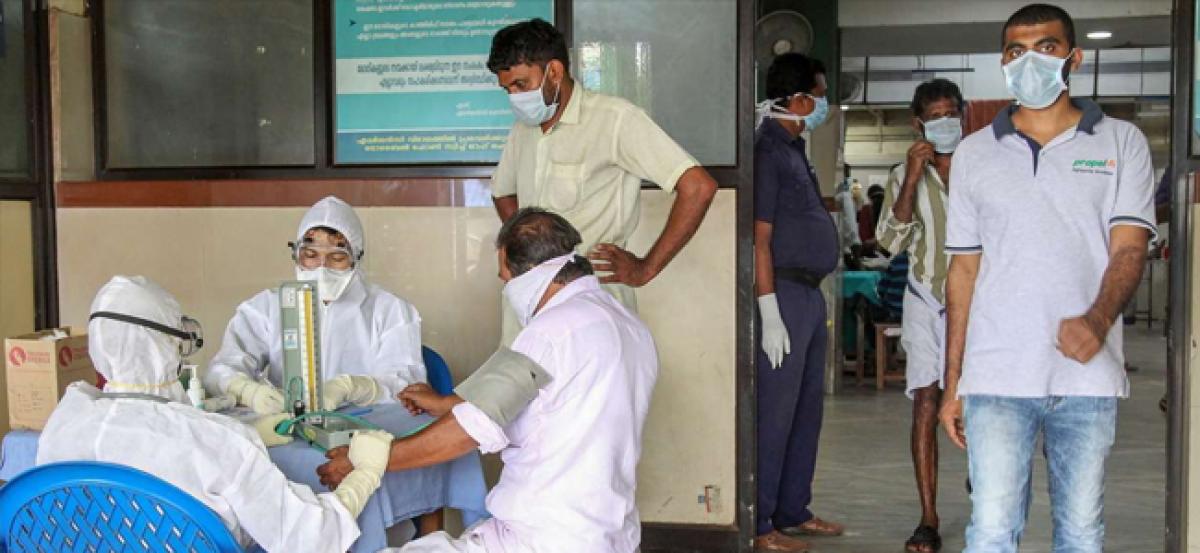Live
- GMR Airports Unveils AI-Powered Digital Twin Platform to Transform Airport Operations
- India poised to become leading maritime player: PM Modi
- Top Causes of Kidney Stones and How to Recognize Silent Symptoms
- India’s renewable energy capacity logs 14.2 pc growth at 213.7 GW
- Winter Session of Odisha Assembly adjourned sine die
- Biden calls Trump's tariff approach 'major mistake'
- After Drama Over Eknath Shinde’s Chief Minister Race, Maharashtra Cabinet Formation Faces New Tensions
- Egyptian FM, Blinken discuss recent developments in Syria
- Iran's supreme leader says Syria's developments result of US-Israeli 'plot'
- Elon Musk to Purchase $100 Million Luxury Mansion Next to Donald Trump's Mar-a-Lago, Report Reveals
Just In

Samples collected from bats in Kerala\'s Kozhikode and Malappuram districts, where 12 people have died of Nipah infection, have tested negative for the virus, according to a report submitted by a central medical team to the Health Ministry today.
Samples collected from bats in Kerala's Kozhikode and Malappuram districts, where 12 people have died of Nipah infection, have tested negative for the virus, according to a report submitted by a central medical team to the Health Ministry today.
The report has ruled out bats and pigs as the primary source of the Nipah outbreak, a Health Ministry official said.
The medical team is now looking into other possible reasons behind the outbreak following the report findings.
A total of 21 samples, including that from seven species of bats, two species of pigs, one bovine and one caprine, were sent to the National Institute of High Security Animal Diseases in Bhopal and the National Institute of Virology in Pune.
"These included the samples of the bats which were found in the well in a house in Kerala's Perambra from where the initial death was reported. They have tested negative for the Nipah virus," the official said.
Samples from humans suspected of contracting Nipah virus have tested negative. "Which means there are only 15 confirmed cases which include 12 deaths. Three persons are undergoing treatment," he said.
The samples from bats found dead in Himachal Pradesh, which were sent to the Pune institute, have been found negative and the two samples of suspected cases from Hyderabad were also negative.
The Health Ministry has urged people not to panic, asserting that the outbreak is "localised" to Kerala. It has issued advisories to the general public and healthcare providers to adopt preventive measures.
The multi-disciplinary central team led by the National Centre for Disease Control director is constantly reviewing the situation in Kerala.
The team has fine-tuned the draft guidelines, case definitions, advisory for healthcare workers, information to the general public, advisories for sample collection and transportation accordingly.
The contact-tracing strategy has been successful, the health ministry said, adding that it has been found that all the reported cases - including the suspected cases - had a direct or indirect contact with the first casualty or his family prior to contracting the disease.
The central medical team has put Kozhikode and Malappuram on "high alert" and has advised authorities to set up facilities to screen suspected cases at exit and entry points of the districts.
The local administration in the two districts has set up a taskforce with a designated control room and a nodal officer has been appointed to collect data to ensure preventive measures.
Nipah virus (NiV) infection is a newly-emerging zoonosis that causes severe disease in animals and humans. The natural host of the virus are fruit bats of the Pteropodidae Family, Pteropus genus.
At present, there is no vaccine or drug to treat NiV infection in humans or animals. The primary treatment for human cases is intensive supportive care.
The virus spreads through close contact with people's secretions and excretions. Eating food that may have droplets of saliva and urine of infected bats can lead to transmission of the virus.
Nipah virus cases were previously reported from West Bengal's Siliguri in 2001 and Nadia district in 2007. A total of 47 deaths were reported from the two districts.

© 2024 Hyderabad Media House Limited/The Hans India. All rights reserved. Powered by hocalwire.com







